

The Church of Scientology and the Work of Its Members
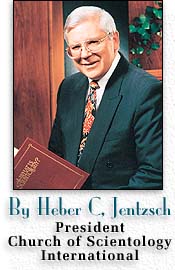

ou have almost certainly heard something about the Church of Scientology. There is little doubt that it has become the most talked about religion in the world today.
And while I am asked many questions, there are three I hear most: “What is Scientology?”, “What do Scientologists believe?” and “What do they do?”
Scientology is an applied religious philosophy which offers tools anyone can use to become happier and more able and to improve conditions in life for himself and others. The word itself literally means “knowing how to know.”
The religion comprises a vast body of knowledge. That knowledge, however, extends from a number of fundamental truths, among them:
That each person is an immortal spiritual being.
That his experiences extend well beyond one life.
That his capabilities are unlimited, even if not presently realized.
Scientology holds man to be basically good, and that his spiritual salvation depends upon himself and his fellows and his attainment of brotherhood with the universe.
It is the only major religion to emerge in the 20th century, and flows from entirely new discoveries about the spirit, life and the interrelationships between the Supreme Being, man and the universe in which he lives.
It is a religious philosophy in the deepest sense of the word, for it is concerned with no less than the total rehabilitation of man’s innate spiritual self—his abilities, his awareness and his knowledge of his own immortality. It answers the fundamental questions of existence: Who am I? Where did I come from? What is the meaning of life? What happens when I die?
And while it follows the oldest of all religious traditions, Scientology is, again, something very new. And it is not taken on faith. Nothing in Scientology is true for a person unless he or she has experienced it and observed it to be true. Scientology is something one does, something one can experience, observe, learn, know and practice oneself.
Thus the Scientology religion elicits interest from people in all walks of life.
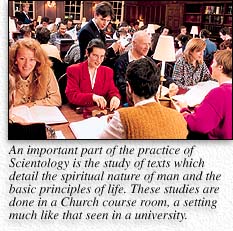 From Individual Use to Broad Application
From Individual Use to Broad Application
The question, “What do Scientologists do?”, cuts to the heart of the matter because Scientology is not about belief, but about application. What Scientologists do clarifies the main reason Scientology appeals to more and more individuals everywhere: the workability of its fundamental principles.
And what could factually be said to make Scientology unique is the breadth of its application and the powerful and beneficial results—which millions can attest to—that arise from its use.
The religion provides a carefully delineated, step-by-step path to complete spiritual freedom. Its central practice, and the primary means by which the basic truths of Scientology are applied to the rehabilitation of the human spirit, is known as auditing. Auditing is delivered by an auditor, from the Latin audire, “one who listens.”
One of the fundamental principles of Scientology is that an individual can improve his condition only if he is allowed to find his own answers to life’s problems. Scientology ministers—auditors—help individuals to accomplish this goal by guiding them to examine their existence through a precise series of steps. By following this gradual process, individuals can improve their ability to face what they are and where they are—peeling away past experiences that have weighed heavily upon them.
Another fundamental aspect of the religion is the study of Scientology principles. The overriding principle of all courses in Scientology is, again, application—in one’s life, with one’s family, one’s friends and neighbors, at work and in society.
The scriptures of the Scientology religion constitute more than 35 million words—and thus represent the largest single body of work on the human mind and spirit. The precise and proven methods of Scientology improve life and bring about a resurgence of man’s capabilities. There is no aspect of life that cannot be bettered through the application of Scientology principles.
Indeed, auditing and training bring improvements never before seen, and often astonishing, but which are attainable whenever applied. It has been said that Scientology will go as far as it works, and on that score the fact that the religion has grown from one small church in Los Angeles to more than 3,200 churches, missions and groups and over 8 million members in 132 countries in just 43 years says a great deal.
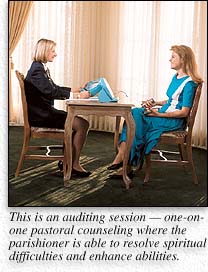 Improving Life and Relieving Suffering
Improving Life and Relieving Suffering
As individuals improve their own lives through the Scientology religion, it is a natural consequence that they reach outward to help others—a role traditionally played by churches before such activities became the province of government welfare programs.
Scientologists engage in a broad spectrum of activities to help their fellow man in all areas of society. In today’s world, where we are faced with mounting illiteracy, drug abuse, violence and crime, knowledge of Scientology can, and does, produce results that, to many, seem like miracles.
In venues that range from South African townships to America’s inner cities, Scientologists have been conducting literacy projects for underprivileged children for decades, opening the door to a brighter future for millions of young people. Their selfless work prompted the City Council of Washington, D.C., to declare a Church of Scientology Community Betterment Day—just one of scores of recognitions of Scientologists’ effective efforts to help youth learn.
In communities all over the world, Scientologists have enabled hard-core drug addicts to break the shackles of substance abuse through support of the Narconon ("no drugs”) drug rehabilitation program. A team from Narconon even recently entered one of the most violent prisons in Mexico, started a drug rehab program with the toughest and most dangerous inmates there—all hard-core heroin users, many of whom could never be paroled due to the nature of their offenses—and got them off of drugs. Those prisoners, in turn, expanded the program to reach hundreds of others.
More than 133,000 people have been freed from the harmful effects of drugs through the efforts of members of the Church of Scientology.
By means of vigorous grassroots drug-prevention campaigns such as the Drug-Free Marshals, Scientologists in the United States and many other lands have helped legions of children to say “No” to drugs, pledging to maintain a drug-free lifestyle, and encouraging their friends and families to do the same.
And in hundreds of North American prisons, thousands of inmates are recovering self-respect and achieving genuine rehabilitation, again through the efforts of Scientologists—who support and volunteer their time to aid the Criminon (“no crime”) program.
Advocating and Safeguarding Basic Freedoms
The actions of Scientologists include many programs to improve conditions in all sectors of society around the globe.
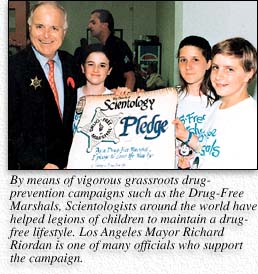
Scientologists are utterly opposed to all things which make man less free in any respect—physically, mentally, spiritually or otherwise. Indeed, the Creed of the Church states, “We of the Church believe: . . . That all men have inalienable rights to their own lives; That all men have inalienable rights to their own defense; That all men have inalienable rights to conceive, choose, assist or support their own organizations, churches and governments. . . .”
Thus, it is not surprising that Church members often find themselves confronting those whose interests are opposed to freedom, whether in the halls of government in Germany or in the private psychiatric hells of Greece.
Scientologists are not merely “philosophically” opposed to groups and individuals who would destroy freedom. They work actively through organizations such as the Citizens Commission on Human Rights (CCHR)—established by the Church in 1969—to bring psychiatric abuse into the sunshine and to force beneficial reforms.
In 1986, a United Nations Human Rights Commission report acknowledged the effectiveness of such efforts. “CCHR has been responsible for many great reforms,” the report stated, in part. “At least 30 bills throughout the world, which would otherwise have inhibited the rights of patients, or would have given psychiatry the power to commit minority groups and individuals against their will, have been defeated by CCHR actions.” By 1997, that total had risen to more than 100 pieces of legislation. P> The Church has a long history of advocating and defending basic freedoms. Scientologists have long been in the vanguard of efforts to advance and protect human rights and personal liberty. One such right, freedom of speech, is so important to Scientologists that it is also included in the Creed, which states, “We of the Church believe: . . . That all men have inalienable rights to think freely, to talk freely, to write freely their own opinions and to counter or utter or write upon the opinions of others . . . .”
It is significant that this magazine—Freedom – was banned in South Africa during the 1970s by that nation’s repressive apartheid government. The Church and Freedom had refused to bow down to government threats and demands to cease speaking out about massive human rights abuses against that nation’s black citizens. Hence, we know the importance of freedom of speech—at a very personal level.
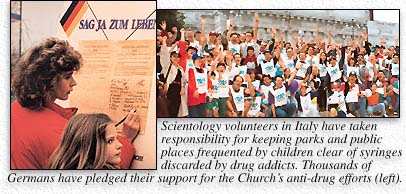
The Church has also long been an effective champion of religious liberty for all and has fought for freedom of religious belief and practice in many arenas. Scientologists firmly believe that any attempt by governments or others to encroach upon the right of free religious expression must be vigorously opposed, for the protection of people of all faiths.
Scientologists have been pioneers in the field of freedom of information in many countries—promoting public access to government files as through the U. S. Freedom of Information Act. In the mid-1970s, the Church published a popular booklet entitled How to Use the Freedom of Information Act. In response to enormous public demand, it was updated and expanded in 1989, with an additional 60,000 copies published and distributed as a public service.
Similar work by Scientologists around the world has directly contributed to the introduction of freedom of information legislation in such nations as France, Canada, Australia, New Zealand, Italy and Belgium.
Open Door
If the above sounds different from what you might expect of a religion, bear in mind that the Church of Scientology is not like any other religion.
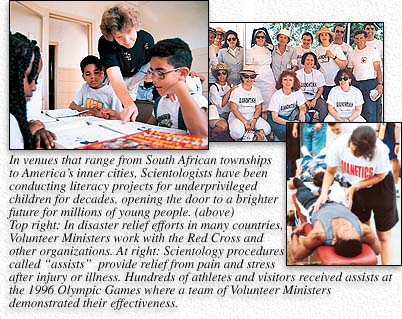
The Aims of Scientology envision “A civilization without insanity, without criminals and without war, where the able can prosper and honest beings can have rights, and where man is free to rise to greater heights.” Across the globe, we move closer to these aims with every passing day.
I invite you to visit any Church of Scientology to find out for yourself why Scientology is the fastest-growing religion in the world. The Church has traditionally welcomed visitors and their questions and has always had an open door policy.
The Church has gone to great lengths to make information about itself and its activities broadly and freely available. As part of this effort, tens of thousands of books, including the encyclopedic reference volumes, What Is Scientology? and The Scientology Handbook, as well as hundreds of thousands of booklets have been distributed to public and university libraries so that the most commonly asked questions can be readily answered.
For those with access to the Internet, the World Wide Web contains the most comprehensive sources of information about Scientology in existence, with more than 30,000 pages of information. The Church’s site currently receives 500,000 hits per week and its popularity has been steadily growing; over the preceding 11 months, it has attracted 15 million hits. Its address is http://www.scientology.org.
Of course, Scientology remains in the news and will continue to do so. And because of our social betterment efforts and our continuing expansion, our impact on society grows with each passing day. I invite you to ask about Scientology —and I welcome you to find out for yourself.


